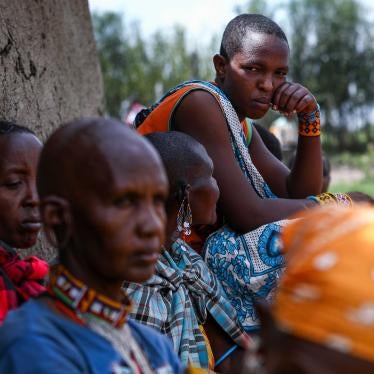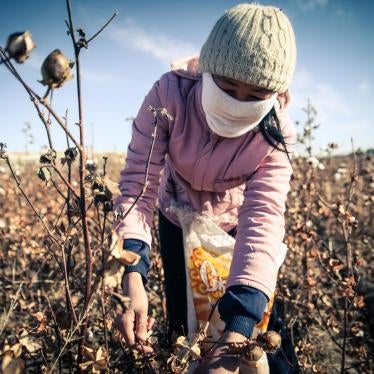In recent years, international financial institutions, including the World Bank Group, European Bank for Reconstruction and Development, and other regional development and investment banks, have increasingly emphasized the importance of participation, good governance, and accountability for development. As both human rights and development experts have noted, respect for human rights of freedom of expression, assembly, and association is crucial for achieving participatory, sustainable, and accountable development.
We, the undersigned, call on all international financial institutions to ensure that the activities they finance respect human rights and that there are spaces for people to participate in the development of IFI projects and hold IFIs to account without risking their security. We call on IFIs to actively support the realization of rights to freedom of expression, assembly, and association, and related human rights, including economic, social and cultural rights (ESCR), in all their activities. We also urge shareholder governments to actively support these reforms at each international financial institution of which they are a member.
We call on international financial institutions to:
- As part of country-level and project-level engagement, systematically analyze the environment for freedoms of expression, assembly, and association, and the realization of other human rights critical for development and the implications for development effectiveness and project outcomes. Build this analysis into country development strategies and project design, including by identifying the actions and measures which will be taken by the IFI and the client to address any risks.
- Develop and institutionalize creative methods to enable people, including marginalized and discriminated against groups, to freely participate in proposed IFI-financed development initiatives that may affect them or that should benefit them, without risk of reprisals.
- Systematically analyze and take measures to mitigate project-related risks relating to freedoms of expression, assembly, and association, and other human rights, including economic, social and cultural rights.
- Establish policies to ensure that information and communication technology investments are not used to limit freedom of expression or infringe international obligations on privacy rights.
- From the earliest stages of project development until following project completion, take all necessary measures to mitigate risks of all forms of threats, attacks, or reprisals to community members, workers, activists, journalists, human rights defenders, and civil society organizations for participating in project development, for criticizing or opposing a project or otherwise speaking out (or being perceived to have spoken out) against a project. Such measures should include: incorporating clauses preventing reprisals in loan agreements and developing an urgent response system to address threats to project critics.
- Consistently highlight the importance of the rights of freedom of expression, assembly, and association for participatory, sustainable, and accountable development in dialogue with all levels of government and in relevant IFI publications. In the face of proposals that would roll back protections of these rights, emphasize to governments the adverse impact such proposals would have on development effectiveness and the IFI’s activities in the country.
- Concerning compliance/accountability mechanisms: develop measures to protect people’s right to remedy, including the right to freely approach and fully participate in the IFI accountability mechanism processes; ensure that those communities likely to be affected by a project are aware of and feel safe in approaching accountability and grievance mechanisms; give accountability mechanisms the tools and power to address situations in which complainants experience retaliation after participating in or attempting to utilize an accountability mechanism process; and ensure that compliance investigations also examine any instances of retaliation for opposition to the project and/or participation in the mechanism process.
Signed,
1. 11.11.11. - Coalition of the Flemish North-South Movement, Belgium
2. A Toda Voz, A.C., Mexico
3. Accountability Counsel, United States
4. ActionAid USA, United States
5. Actions pour les Droits, l`Environnement et la Vie, Democratic Republic of Congo
6. African Law Foundation (AFRILAW), Nigeria
7. African Resources Watch (AFREWATCH), Democratic Republic of Congo
8. Alianza para la Conservación y el Desarrollo (ACD), Panama
9. Al-Noor Universal Foundation, Iraq
10. Alternative ASEAN Network on Burma, Thailand
11. Alyansa Tigil Mina (ATM), Philippines
12. Amazon Watch, United States
13. American Jewish World Service, United States
14. Amnesty International, United Kingdom
15. Anticorruption Business Council of the Kyrgyz Republic, Kyrgyz Republic
16. Arabic Water Forum, Morocco
17. Article 19, United Kingdom
18. Asia Indigenous Peoples Pact, Regional
19. Asian Forum for Human Rights and Development (FORUM – Asia), Regional
20. Asociación Interamericana para la Defensa del Ambiente, Regional
21. Assembly of AL-Inbithaq for Development & Economic Development, Iraq
22. Association for Promotion Sustainable Development, India
23. Association Green Istria, Croatia
24. Association of Human Rights Defenders and Promoters- HRDP, Myanmar
25. ASEAN Parliamentarians for Human Rights, Regional
26. Atgaja, Lithuania
27. Bank Information Center, United States
28. BankTrack, Netherlands
29. Bankwatch Romania, Romania
30. Bantay Kita-Publish What You Pay, Philippines
31. Biodiversity Conservation Center, Russia
32. Both ENDS, Netherlands
33. Bretton Woods Project, United Kingdom
34. Buliisa Initiative for Rural Development Organisation (BIRUDO), Uganda
35. Business and Human Rights Resource Center, International
36. Business and Welfare Initiatives Ltd., Bangladesh
37. CEE Bankwatch, Czech Republic
38. Center for Bangladesh Studies, Bangladesh
39. Center for Ecology and Sustainable Development, Serbia
40. Center for Environmental Information and Education, Bulgaria
41. Center for International Environmental Law, United States
42. Center for Studies and Economic Media, Yemen
43. Center for Support of Civil Initiatives, Russia
44. Centre for Research on Multinational Corporations - SOMO, Netherlands
45. Centre for Transport and Energy, Czech Republic
46. Centro Mexicano de Derecho Ambiental, A.C., Mexico
47. Citizens for Justice, Malawi
48. CIVICUS, International
49. Columban Center for Advocacy and Outreach, United States
50. Columbia Law School Human Rights Clinic, United States
51. Commercial Media Center, Iraq
52. Conectas Direitos Humanos, Brazil
53. Conseil régional des organisations non gouvernementales de développement, Democratic Republic of Congo
54. Cotton Campaign, International
55. Counter Balance, Czech Republic
56. Crude Accountability, United States
57. Derechos Humanos y Medio Ambiente, Peru
58. Due Process of Law Foundation, International
59. EarthRights International, International
60. Ecological Society Green Salvation, Kazakhstan
61. EcoLur Informational NGO, Armenia
62. Eco – sense, Macedonia
63. Egyptian Center of Civil and Legislative Reform, Egypt
64. Egyptian Center for Economic and Social Rights, Egypt
65. Empower India, India
66. Environmental Council of Primorye Territory, Russia
67. Equitable Cambodia, Cambodia
68. Estonian Green Movement, Estonia
69. European Center for Not-for-Profit-Law, Hungary
70. Fédération internationale des ligues des droits de l’Homme, International
71. For the Earth (Ze Zemiata), Bulgaria
72. Forest Peoples Programme, International
73. Foro Ciudadano de Participación por la Justicia y los Derechos Humanos (FOCO), Argentina
74. Forum of Dialogue and Partnership for Development, Egypt
75. Foundation for the Conservation of the Earth, Nigeria
76. Foundation for Environmental Rights, Advocacy and Development (FENRAD), Nigeria
77. Freedom House, United States
78. Friends of the Earth – CEPA, Slovakia
79. Friends of the Earth U.S., United States
80. Friends of the Forests of Siberia, Russia
81. Front Line Defenders, Regional
82. Fundación Ambiente y Recursos Naturales, Argentina
83. Fundacion MaderaVerde, Honduras
84. Fundar, Centro de Análisis e Investigación, Mexico
85. FUNDEPS, Argentina
86. Gender Action, United States
87. Governance and Social Accountability Tunisia, Tunisia
88. Greater Active Reconstruction & Justice Action Network-Nepal, Nepal
89. Green Action (Zelena Akcija), Croatia
90. Green Alternative, Georgia
91. Greenpeace, Global
92. Guatemala Human Rights Commission, United States
93. Habi Center for Environmental Rights, Egypt
94. Hann Baykeeper Waterkeeper Alliance, Senegal
95. Heinrich Böll Stiftung, Germany
96. Hnuti DUHA, Czech Republic
97. Human Rights Watch, United States
98. Inclusive Development International, United States
99. Indigenous Women League Nepal, Nepal
100. International Accountability Project, International
101. International Environmental Union, Russia
102. International Labor Rights Forum, International
103. International Rivers, International
104. Inspirator Muda Nusantara, Indonesia
105. Institut de Recherche en Droits Humains (IRDH), Democratic Republic of Congo
106. ITDP, Mexico
107. Jamaa Resource Initiatives, Kenya
108. Jewish World Watch, United States
109. JONCTION, Senegal
110. Just Associates (JASS), International
111. Kalipunan ng Mga Katutubong Mamamayan ng Pilipinas (KATRIBU), Philippines
112. Khpal Kore organization(KKO), Pakistan
113. Krasnoyarsk Regional Public Environmental Organization "Plotina", Russia
114. Krityan and UNESCO Club Jamshedpur, India
115. Latvian Green Movement, Latvia
116. L'Observatoire d'Etudes et d'Appui à la Responsabilité Sociale et Environnementale, Democratic Republic of Congo
117. Livelihood and Environment Ghana (LEG), Ghana
118. Lumière Synergie pour le développement, Senegal
119. Maison de Mines du Kivu, Democratic Republic of Congo
120. Maryknoll Office for Global Concerns, United States
121. Naga Peoples Movement for Human Rights (NPMHR), Nagaland / India
122. Narasha Community Development Group, Kenya
123. National Ecological Centre of Ukraine, Ukraine
124. National Society of Conservationists – Friends of the Earth Hungary
125. Network in Solidarity with the People of Guatemala (NISGUA)
126. NGO Forum on ADB, Regional
127. NGO Green Don, Russia
128. Observatoire Gouvernance et Paix, Democratic Republic of Congo
129. Oil Workers' Rights Protection Organization Public Union, Azerbaijan
130. Ong croissance saine environnement, Gabon
131. Ong hadassa, Gabon
132. Organic Consumers Association, Mexico
133. Oxfam International, United Kingdom
134. OT Watch, Mongolia
135. Participatory Research Action Network, Bangladesh
136. Phenix Center Jordan, Jordan
137. Polish Green Network Poland
138. Press Freedom Advocacy Association, Iraq
139. Project on Organizing, Development, Education and Research (PODER), Regional
140. Protection International, Belgium
141. Proyecto Tarahumara Sustentable, Mexico
142. Public Research Center “Zhivaya Voda”, Russia
143. Radanar Ayar Rural Development Association, Myanmar
144. Regeneration International, Mexico
145. Rencontre Africaine pour la Défense des Droits de l'Homme (RADDHO), Senegal
146. Research and Preservation Agency of Taiga, Russia
147. Réseau Camerounais des Organisations des Droits de l'Homme, Cameroon
148. Réseau sénégal des défensurs des Droits humains (RSDD), Senegal
149. Responsible Sourcing Network, United States
150. Rivers without Boundaries International Coalition, Russia - Mongolia - China
151. Robert F. Kennedy Human Rights, United States
152. Sakhalin Environmental Watch, Russia
153. Sawit Watch, Indonesia
154. Seeds - India, India
155. Sisters of Mercy of the Americas' Institute Justice Team, International
156. Social Justice Connection, Canada
157. Sursiendo, Comunicación y Cultura Digital, Mexico
158. Sustainable Development Foundation, Thailand
159. Tatarstan Branch of Russian Environmental Union, Germany
160. TAKKOM JERRY Polyvalence Culturelle et Environnementale, Senegal
161. The Gate of Culture and Development, Morocco
162. Tunisian Association of Transparency in Energy and Mines (ATTEM), Tunisia
163. Uganda Land Alliance, Uganda
164. Urgent Action Fund for Women's Human Rights, Global
165. Urgewald, Germany
166. Uzbek German Forum for Human Rights, Germany
167. Youth Federation of Indigenous Nationalities Nepal, Nepal
168. Walk Free, International
169. Zo Indigenous Forum Mizoram, India







